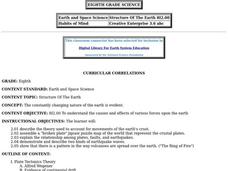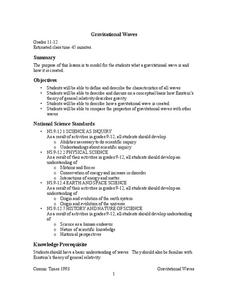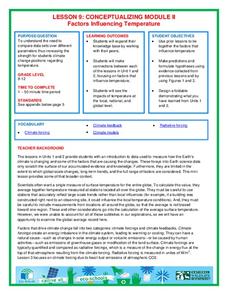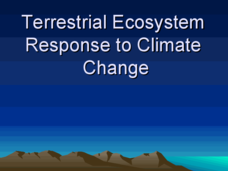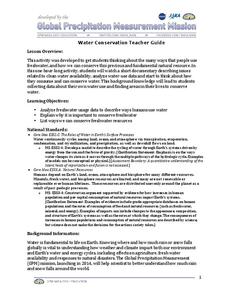Curated OER
Structure of the Earth
Eighth graders examine the forces that are constantly acting on the Earth. They describe the theory of tectonic plates and demonstrate the two kinds of earthquake waves. They also examine the role of volcanoes in the structure of the...
Curated OER
Simple Machines
First graders discuss work, force, and energy. They study how work is done. Students discuss various types of work that are done. They act out how work is done. Student draw pictures of types of work they have done.
Curated OER
Rocks Up!
Students will design and build a structure to support a rock. Students will use their knowledge of movement of objects to determine the proper base to be built to support their rock. Students will explore their natural area for...
STEM for Teachers
Tsunami!
How does the depth of an ocean affect the speed of a tsunami's waves? Use Jell-o, graham crackers, and marshmallows to model the effects of an underwater earthquake and its resulting tsunami. The lesson includes hands-on activities,...
Curated OER
Sandscapes to Landscapes
Students explore landscapes and create their own in a creative project.
Teach Engineering
Get Me Off This Planet
What do Newton's Laws have to do with getting from Earth to Mars?The activities in this resource show how Newton's Laws work with rockets to get them into space. Background information includes facts about orbits and how orbits are used...
Curated OER
How Wind Works
Second graders investigate the process that creates wind. In this wind lesson, 2nd graders create a wind diagram. Students write an essay to accompany their diagram.
Curated OER
Solar System: The Four Inner Planets and Earth's Moon and Astronauts
Second graders read THe Magic School Bus: Lost in the Solar System. In this language arts and science lesson, 2nd graders explore the four inner planets. Students view the inner planets using Google Earth.
Curated OER
Motions and Forces
Sixth graders investigate the construction of a magnet and the force it produces. They identify various materials as magnetic or non-magnetic, discuss the properties of magnetic properties, and conduct an experiment with a compass and...
NASA
Gravitational Waves
Young scientists participate in a hands-on experiment to explore Einstein's theory of relativity in a creative manner. They investigate various waves and compare their characteristics as they discuss how each wave is created. Next,...
Science Matters
Ring of Fire
Over a period of 35 years, earthquakes and volcanoes combined only accounted for 1.5 percent of the deaths from natural disasters in the United States. The 15th lesson in a 20-part series connects the locations of earthquakes and...
Curated OER
Pump It Up
Students use water in a flask to simulate how oil is pumped or forced out of the Earth by pressure from natural gas or human machinery. In this oil lesson plan, students complete a lab packet and work in groups.
Curated OER
The Earth Around Us: Air, Water & Soil
Second graders explore erosion and find the factors effecting erosion of hillsides. In this erosion lesson, 2nd graders experiment by creating a hillside and simulating rain. Students discuss and record their results on a worksheet.
Curated OER
Water Cycle
High schoolers identify the different stages in the water cycle. In this earth science lesson plan, students calculate the residence time of water in oceans using a mathematical formula. They explain how this cycle regulates the Earth's...
National Wildlife Federation
Conceptualizing Module II - Putting It All Together
"Creativity is just connecting things." - Steve Jobs. After weeks of researching climate change, the ninth lesson in a series of 21 combines the data and analysis to address essential questions. It covers natural phenomenon, human...
Curated OER
Fossil Fuels (Part III), The Geology of Coal
Do not overlook this set of lessons just because your school does not have a data analysis system. There is plenty of material here to administer a complete mini unit on the formation, distribution, and properties of coal. Since it...
Curated OER
Terrestrial Ecosystem Response to Climate Change
An extensive investigation of the Earth's climate changes awaits your environmental science classes. This top-notch presentation begins by looking at the history of Earth's climate and then predicts the impact on each major terrestrial...
Centers for Ocean Sciences
Ocean and Great Lakes Literacy: Principle 1
Is your current lesson plan for salt and freshwater literacy leaving you high and dry? If so, dive into part one of a seven-part series that explores the physical features of Earth's salt and freshwater sources. Junior hydrologists...
McAuliffe-Shepard Discovery Center
Global Warming in a Jar
This well-organized lab activity introduces earth science pupils to the greenhouse effect. They will set up two experiments to monitor temperatures in an open jar, a closed jar, and a closed jar containing water. Ideally, you would have...
Curated OER
Wind Energy
Students explore wind energy by making a pinwheel to model a wind turbine. They experiment with their turbine by placing it in different locations for optimal energy.
Curated OER
Cruising the Mantle
Young scholars explore the plate boundaries of the earth. Through the use of video, internet and hands-on activities, students examine the types of plate boundaries. They create a model to illustrate the movement and interaction of the...
Curated OER
Water Conservation
Open learners' eyes to the challenge of finding safe drinking water – something we often take for granted in our country. The PowerPoint presentation includes images, graphs, diagrams, and even a video to stimulate discussion on how we...
Mr. E. Science
Erosion and Deposition
Get an in-depth look into erosion and deposition with a 23-slide presentation that details how gravity, water, waves, wind, and glaciers cause changes to the Earth's surface. Each slide consists of detailed images equipped with labels,...
Curated OER
Ocean Currents
Students label the names, relative temperature, distribution, and direction of flow of major ocean currents on a world map. They also explore and model the natural forces that affect the movement of ocean currents through demonstrations...


